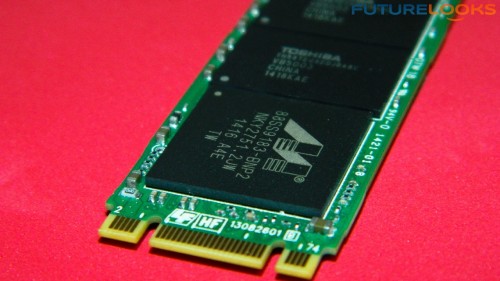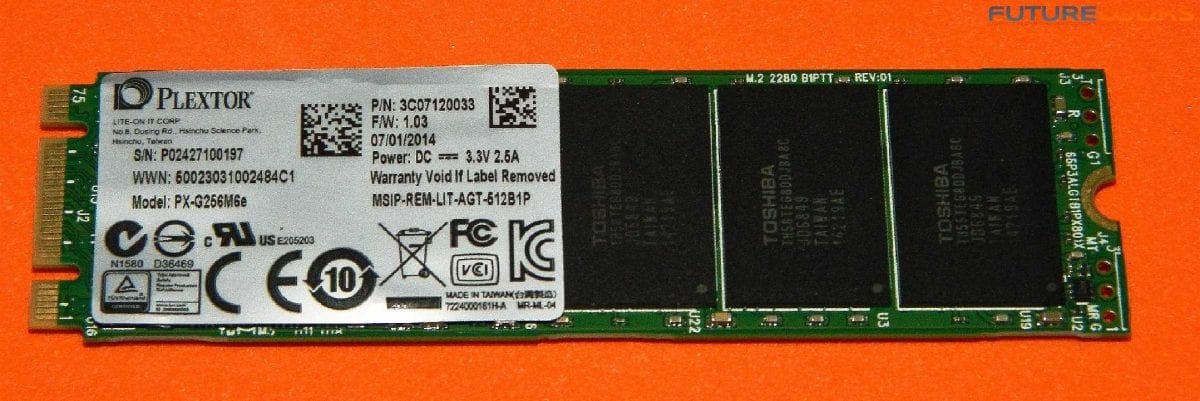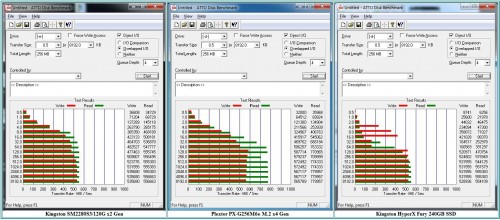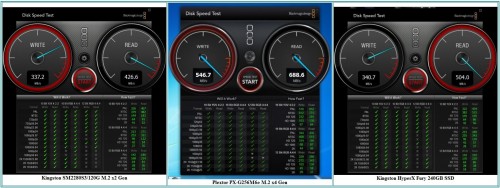Benchmark Results

Individual tests were performed using CrystalDiskMark, ATTO, and BlackMagic benchmarks. The results revealed there was virtually no performance difference between the small integrated M.2 port and an M.2 expansion card, which bodes well for folks looking to upgrade to faster storage on older systems without M.2 support onboard. Lets look at the scores for clarification..
CrystalDiskMark
Compared to the Kingston x2 M.2 SSD, the Plextor x4 M.2 SSD is fast! It’s definitely more than 250 MB/s faster reading and 80 MB/s writing sequentially. 4K performance doesn’t seem much better but 9 to 18 MB/s more a second means even better overall responsiveness when launching apps and doing anything disk intensive on the desktop. It’s safe to say that the Plextor PX-G256M6e will manage larger files more quickly in the end, with those SATA3 crushing speeds.
ATTO – Disk Benchmark
Overlapped IO performance reveals how responsive the Plextor PX-G256M6e is. Its read performance out-paces anything we have in the lab that isn’t using this technology. However, the 4K read and write performance are much like the Kingston M.2 x2 and Fury SSDs. This is no doubt due to controller tuning as there’s often a trade off between small and large block performance. With M.2 PCIE SSDs still being fairly new, there may be room to extract a bit more performance in future firmware updates.
BlackMagic Disk Speed Test
This is one of our newer benchmarks that truly gives a real time performance indication of storage. The Plextor PX-G256M6e is fast enough to read and write almost all 1080p high quality video by BlackMagic’s standards. There’s so much bandwidth needed for something like this that it’s impressive to see a single device measure up so well. The only way to ensure that with technology before M.2 PCIE SSDs was to run high performance SSDs in RAID, which take up much more room than a single M.2 PCIE SSD solution.
Final Thoughts

Most every SSD, whether standard SATA, mSATA, or PCIE SSD device will all transform the performance of your computer, and turn it in to a more efficient tool for handling large media, apps and data. Not only do our systems boot much faster, but all programs load up more quickly, and are more responsive, thanks to the large amounts of bandwidth readily available. The Plextor PX-G256M6e 256GB M.2 SSD is no exception offering more bandwidth than any conventional SATA3 solution on the market.
In terms of real world benefits, boot times were very similar to many of the performance SATA3 SSDs in our lab, but just a couple seconds quicker due to the 4K data block performance increase. The real magic will be evident when you’re working on large data intensive projects, even launching very large games and apps. And when it comes to moving around data that is highly sensitive to lag, like a high bit rate 1080p video stream, this solution makes even more sense. And the best part is, the solution can be retrofitted to older systems that are still very powerful, but may not have access to faster storage solutions of today.
The Plextor PX-G256M6e is a great high performance M.2 SSD solution, and at $220 US/CA (Newegg/Amazon), the unit is competitive with other similar offerings, but isn’t quite as affordable as SATA3 SSDs at the same capacity. So you have to weigh the benefits of performance with the benefits of capacity.
Currently, the PX-G256M6e works best with an x4 M.2 slot found on more expensive Intel X99 motherboards or in a PCIE expansion card. In fact, if Plextor bundled their PCIE adapter card by default, that would make it a much more accessible product to users with all levels of systems, but may lack this one solution that removes the storage bottleneck.
But for now, the Plextor PX-G256M6e offers extremely high performance, encryption with negligible performance loss, and excellent compatibility with today’s (and yesterday’s) high performance systems.
Pros
- Great all around performance
- Faster than standard SATA3 or mSATA SSDs
- Encryption onboard
- Compatible with every platform tested so far
Cons
- Priced significantly higher than SATA3 SSDs of similar capacity
Overall Rating: 9.0 / 10.0

Help Us Improve Our Reviews By Leaving a Comment Below!




